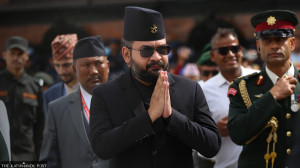Money
Govt treasury surplus reaches all-time high
The government’s treasury surplus has hit an all-time high of around Rs 216 billion with government making last-minute efforts to expedite capital spending and give impetus to post-quake reconstruction works.
The government’s treasury surplus has hit an all-time high of around Rs 216 billion with government making last-minute efforts to expedite capital spending and give impetus to post-quake reconstruction works.
With less than one month left for the current fiscal year to end, capital expenditure is limited to around 29 percent of the allocated budget, while overall budget spending stands at around 49.50 percent. As of June 15, capital expenditure stood at Rs 59.56 billion against the allocation of Rs208 billion, according to latest statistics of Financial Comptroller General Office (FCGO).
The government expects to spend capital budget of Rs 159 billion before the end of the current fiscal year, in a clear indication that most of the amount will be spend in the last month (mid-June to mid-July).
Government officials claimed that capital expenditure has been on the slower side because “payment for a sizeable amount of expenditure has not been made”.
But Min Bahadur Shrestha, executive director of Nepal Rastra Bank (NRB), said, “The government’s treasury has seen a record surplus due to low spending and high internal loan of Rs 88 billion.”
The government after a hiatus of two years raised internal loan this fiscal year with a view to mobilising the fund in the next fiscal year.
As per the budgetary announcement for next fiscal year, the government plans to mobilise Rs 59.41 billion through current year’s cash balance. Besides, dismal performance of the National Reconstruction Authority (NRA) also resulted in low expenditure.
The NRA said it has released over Rs 21 billion for reconstruction so far against the budgetary allocation of Rs 74 billion.
Ram Prasad Thapaliya, spokesperson for the NRA, admitted that implementing agencies failed to spend the allocated amount.
“We had released Rs 2.5 billion for reconstruction of schools, but we have been informed that only Rs 500 million could be spent,” he said, adding: “The situation when it comes to spending under reconstruction of heritage sites and drinking water facilities is no different.”
The government’s spending in development projects creates demands for construction materials and services encouraging investment from the private sector too.
Former finance minister Ram Sharan Mahat said although the impact of the earthquake and blockade were major factors behind poor expenditure, continued weak performance of contractors, government’s inability to enforce contract agreement and frequent transfer of project staffers also kept the capital expenditure on the slower side.
“During my tenure as finance minister, I had initiated some reform measures such as new public procurement act, multi-year contract and transfer of budget for better performing projects from those which were not performing, but these initiatives were not implemented,” he said.
The government may get the benefit of doubt for poor capital expenditure, especially in the backdrop of border blockade that crippled the country’s economy for almost five months, but the way the capital budget is being spent in the last quarters of the fiscal year is a worrying sing, say experts.
Officials at the Ministry of Finance said the unspent money in the treasury could be used for providing relief to earthquake survivors and pork-barrel spending.
“The trend in the last five years shows 35-52 percent of capital budget is spent in the last quarter,” said Shrestha of NRB. “And, this fiscal is no exception.”
The record of FCGO clearly shows that capital expenditure from mid-May to Mid-June stood at Rs 13.34 billion, which was Rs 10.86 billion the previous month.
During the month of mid-March to Mid-April, capital expenditure was Rs 9.61 billion. In the second month of the current fiscal year, capital expenditure was only Rs 1.02 billion.
Economists say the fallout of expedited spending in the last months of a fiscal year means most of the works are completed only on papers in many cases and quality is not ensured.
“As many projects are included in the budget without adequate preparation, budget of these projects are not spent on time,” said Jagadish Chandra Pokharel, former vice-chairman of the National Planning Commission (NPC).
Officials, however, say they are hopeful of things getting better in the next fiscal, as the new budget has been presented early, which they say will enable authorities to spend budget on time as procedural works such as project approval from the NPC and other tendering process could be completed early. But Pokharel said: “If local and other elections are held this year, the government mechanism will be busy with that and this will affect budget spending.”




 7.12°C Kathmandu
7.12°C Kathmandu














